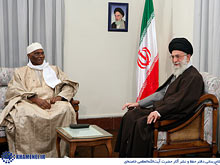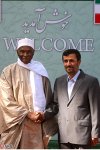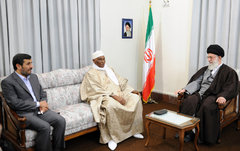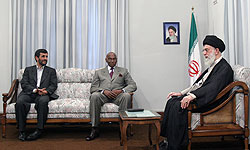Friday
Oct302009
More Time, Please: Ahmadinejad's Legitimacy and Iran's Nuclear Talks
 Friday, October 30, 2009 at 6:48
Friday, October 30, 2009 at 6:48
Iran: Text of Ahmadinejad Speech in Mashaad (29 October)
Latest from Iran (30 October): Now to the Real Contest
The Latest from Iran (29 October): Opposition Momentum?
Receive our latest updates by email or RSS SUBSCRIBE TO OUR FEED
Buy Us A Cup of Coffee? Help Enduring America Expand Its Coverage and Analysis
 Here is what President Ahmadinejad said in a nationally-televised speech from Mashaad on Thursday.
Here is what President Ahmadinejad said in a nationally-televised speech from Mashaad on Thursday.
Iran is strong. I am strong. Iran is strong because I am strong.
While the President covered a range of domestic and international issues, the passage on the talks on Iran's nuclear programme will receive the most attention today. As The Daily Telegraph of London declares, "Iran claims victory in nuclear battle with the West".
Unfortunately most coverage in the West will miss the significance of the speech. The New York Times, relying on usual on unnamed "diplomats in Europe and unnamed officials", is already proclaiming, "Iran Rejects Deal to Ship Out Uranium, Officials Report", a journalistic approach echoed by the Los Angeles Times.
That is untrue, at least according to both the Iranian Government and the International Atomic Energy Agency: Tehran's reply accepts the "framework" but raises issues over timing and amount of uranium stock to be delivered to Russia for reprocessing. More importantly, it shoves aside Ahmadinejad's presentation:
That is not a rejection of discussions with the "West"; it is an embrace of them. But it is an embrace based on the premise that the US and other countries have knocked at Tehran's door, gone down on bended knee, and asked forgiveness. Iran is no longer an international outsider; it is an accepted nuclear power.
Iranian state media is running quickly with this line. Press TV, for example, is featuring, "Israel worried by IAEA draft accord on Iran", noting, "Israeli Defense Minister Ehud Barak says a draft accord presented by the IAEA would lead to recognition of Iran's nuclear enrichment program."
This is only part of the story, however. Let's get personal: Mahmoud Ahmadinejad is fighting for his authority, not only against the Green opposition but against those within the establishment who object to his high-profile assertion of power. Remember how, only a few days ago, the stories were of Parliamentary leaders like Ali Larijani trashing the nuclear deal and of indications that the Supreme Leader was stepping in both to cast a veto and to put Ahmadinejad in his place?
No sign of those nay-sayers yesterday. Instead this was Iran as the President and the President as Iran.
That's not to say that, for the sake of Ahmadinejad's legitimacy and Iran's international position, Tehran will soon accept the US-led plan for third-party enrichment. To the contrary, the Iranians have serious objections to the details. The most straightforward is that the 80 percent of uranium stock to be shipped to Russia is far more than is necessary to keep Iran's medical research reactor --- the catalyst for this proposal in June --- operating for the rest of its lifespan. So, in Tehran's eyes, the current document is intended as much to keep most of its uranium "hostage" as it is to provide a stable supply for Iran's civilian needs.
And, given Ahmadinejad's position, the political advantages of spinning out the talks are there to be grasped. If there are alterations in the plan to reduce the amount shipped below 80 percent and to send it out in stages rather than in one delivery, these will be concession to Iran's and the President's strength. If the "West" walks away from the table, this will be an indication of their continuing deceptions and mistakes --- despite their apparent request for forgiveness from Tehran --- and Iran will be in the right as it maintains nuclear sovereignty.
Of course, there will be pressure in the US Congress for sanctions (the House of Representatives, despite the ongoing talks, has already passed a measure for tougher economic restrictions). Those, however, are President Obama's worry, as Russia and China are unlikely to give any support for multilateral steps.
So give Ahmadinejad credit for a political victory in Mashaad yesterday. But think of that victory as only a preliminary skirmish on an outside battlefield.
For the next time Ahmadinejad is due in Mashaad is on 13 Aban (4 November).
Latest from Iran (30 October): Now to the Real Contest
The Latest from Iran (29 October): Opposition Momentum?
Receive our latest updates by email or RSS SUBSCRIBE TO OUR FEED
Buy Us A Cup of Coffee? Help Enduring America Expand Its Coverage and Analysis
 Here is what President Ahmadinejad said in a nationally-televised speech from Mashaad on Thursday.
Here is what President Ahmadinejad said in a nationally-televised speech from Mashaad on Thursday.Iran is strong. I am strong. Iran is strong because I am strong.
While the President covered a range of domestic and international issues, the passage on the talks on Iran's nuclear programme will receive the most attention today. As The Daily Telegraph of London declares, "Iran claims victory in nuclear battle with the West".
Unfortunately most coverage in the West will miss the significance of the speech. The New York Times, relying on usual on unnamed "diplomats in Europe and unnamed officials", is already proclaiming, "Iran Rejects Deal to Ship Out Uranium, Officials Report", a journalistic approach echoed by the Los Angeles Times.
That is untrue, at least according to both the Iranian Government and the International Atomic Energy Agency: Tehran's reply accepts the "framework" but raises issues over timing and amount of uranium stock to be delivered to Russia for reprocessing. More importantly, it shoves aside Ahmadinejad's presentation:
I don’t want to repeat history for you but can you remember where we were a few years ago? Back then, they shouted at us, issued resolutions against us, waged psychological warfare against us and issued sanctions against us. They told us that we should completely give up our nuclear program. Where are we today? Today, they pursue nuclear cooperation with the Iranian nation.
There were days when they said that we should not have the technology at all, but today they say: let us cooperate. Iran’s position in nuclear industry is well-established. Today, Iran’s nuclear activities are considered to be a normal and obvious procedure and an absolute right of the Iranian nation.
That is not a rejection of discussions with the "West"; it is an embrace of them. But it is an embrace based on the premise that the US and other countries have knocked at Tehran's door, gone down on bended knee, and asked forgiveness. Iran is no longer an international outsider; it is an accepted nuclear power.
Iranian state media is running quickly with this line. Press TV, for example, is featuring, "Israel worried by IAEA draft accord on Iran", noting, "Israeli Defense Minister Ehud Barak says a draft accord presented by the IAEA would lead to recognition of Iran's nuclear enrichment program."
This is only part of the story, however. Let's get personal: Mahmoud Ahmadinejad is fighting for his authority, not only against the Green opposition but against those within the establishment who object to his high-profile assertion of power. Remember how, only a few days ago, the stories were of Parliamentary leaders like Ali Larijani trashing the nuclear deal and of indications that the Supreme Leader was stepping in both to cast a veto and to put Ahmadinejad in his place?
No sign of those nay-sayers yesterday. Instead this was Iran as the President and the President as Iran.
That's not to say that, for the sake of Ahmadinejad's legitimacy and Iran's international position, Tehran will soon accept the US-led plan for third-party enrichment. To the contrary, the Iranians have serious objections to the details. The most straightforward is that the 80 percent of uranium stock to be shipped to Russia is far more than is necessary to keep Iran's medical research reactor --- the catalyst for this proposal in June --- operating for the rest of its lifespan. So, in Tehran's eyes, the current document is intended as much to keep most of its uranium "hostage" as it is to provide a stable supply for Iran's civilian needs.
And, given Ahmadinejad's position, the political advantages of spinning out the talks are there to be grasped. If there are alterations in the plan to reduce the amount shipped below 80 percent and to send it out in stages rather than in one delivery, these will be concession to Iran's and the President's strength. If the "West" walks away from the table, this will be an indication of their continuing deceptions and mistakes --- despite their apparent request for forgiveness from Tehran --- and Iran will be in the right as it maintains nuclear sovereignty.
Of course, there will be pressure in the US Congress for sanctions (the House of Representatives, despite the ongoing talks, has already passed a measure for tougher economic restrictions). Those, however, are President Obama's worry, as Russia and China are unlikely to give any support for multilateral steps.
So give Ahmadinejad credit for a political victory in Mashaad yesterday. But think of that victory as only a preliminary skirmish on an outside battlefield.
For the next time Ahmadinejad is due in Mashaad is on 13 Aban (4 November).

 2100 GMT: And for those looking for yet another account of the Karroubi-Mousavi meeting (see 1220 and 1350 GMT), here is the version from Mousavi's website
2100 GMT: And for those looking for yet another account of the Karroubi-Mousavi meeting (see 1220 and 1350 GMT), here is the version from Mousavi's website 



 UPDATE 1900 GMT: Yahoo! has issued
UPDATE 1900 GMT: Yahoo! has issued 